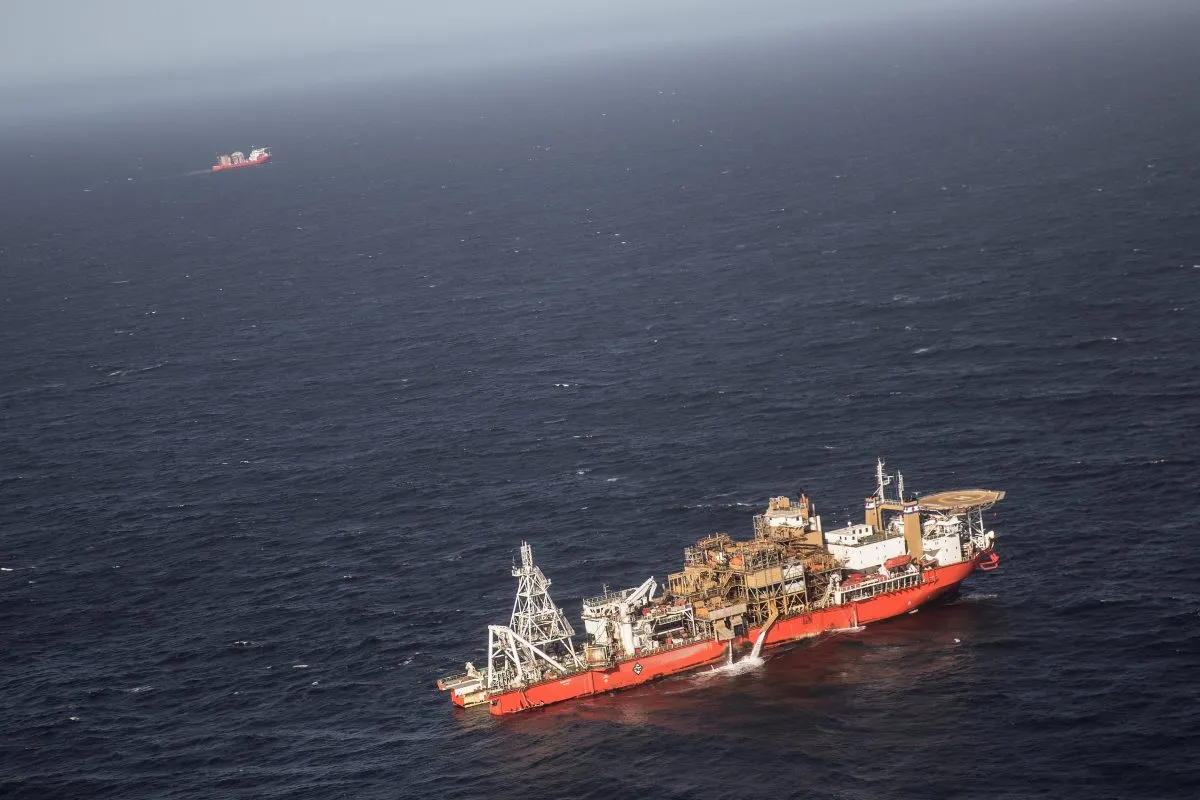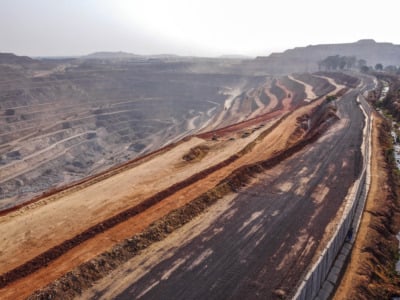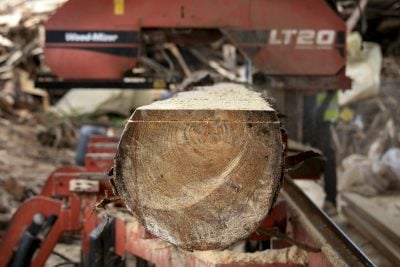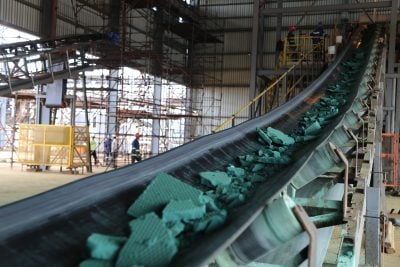A shaggy-haired man with striking features stands in front of the camera at a mining conference in Cape Town, squeezing a dark rock in the palms of his hands. “We’re all about recovering metals from the ocean floor, and I have one in my hand here. This is like a battery in a rock” – he forcefully taps the rock with his fingers – “we have nickel, we have copper, cobalt, and manganese.”
The unshaven man is Gerard Barron, CEO of The Metals Company, a Canadian firm which is lobbying the United Nations International Seabed Authority (ISA) to permit it to begin extracting minerals from the deep seabed. In June 2021, the Pacific island state of Nauru – which is sponsoring Metals Company subsidiary Nauru Ocean Resources Inc to explore a nickel- and manganese-rich area of the Pacific – triggered what is known as the two-year rule, a treaty provision that forces the ISA to develop a deep-sea mining code and regulations within two years of the notification. States are within their rights to submit an application for mineral exploitation and the ISA is obliged to consider it even if no such code has been agreed upon.
“It allows for the possibility of unregulated mining, but also places a lot of political pressure on the negotiators to adopt a deeply-flawed mining code,” says Emma Wilson, policy officer at the Deep Sea Conservation Coalition (DSCC).
Africa’s position on deep-sea mining
According to Wilson, the last formal united position that the African group at the ISA took emerged in writing shortly after Nauru activated the two-year rule. In a short document, the African group stated that questions remain on how the benefits of mining activity would be equitably shared. The minerals of the deep sea have been designated by the UN as the “common heritage of humankind”.
The African group expressed its concern about the lack of agreement on the mechanisms for compensation for the extraction of the mineral resources, which are still the subject of intense negotiation. The group also voiced alarm that there was not yet enough scientific data on deep-sea ecosystems and their connections to the broader ocean ecosystem to know what the effects of deep-sea mining could be.
No mining rulebook arrived in 2023, and Africa’s position on deep-sea mining has gone a little “blurry” since then, says Wilson. Remarking on the most recent ISA meetings, which took place in Jamaica this July, Wilson said that there is a leadership void in the African group. “Currently there are some positions within the group that would in some ways go against the written position in 2021, however there are also some in the group advocating for precaution and to wait for the science. There seems to be a kind of dissonance in the group.”
“As it stands today, the African group would really not benefit in any way from the activity going ahead from an economic perspective,” claims Wilson.
Africa must get more involved
Edwin Egede, a professor of international law and international relations at Cardiff University, who has written extensively on Africa’s approach to deep-sea mining, says that African countries have ignored the opportunity for too long. “For a long time the African position has been ‘we have too many problems in Africa, so let’s not bother’.” Egede acknowledges that there has been a shift, with African countries becoming more involved at the ISA. The continent is, however, yet to have an exploration contract in its name.
“Any entity – government body, or private entity sponsored by a country – has to get a contract with the ISA in order to explore international waters. No African country has sponsored any entity.”
Currently 31 exploration contracts have been granted by the ISA: India has 2 and is busy applying for more, while China has 5.
“African states can pull together, under the auspices of the African Union, or one of the regional economic communities such as ECOWAS, or the SADC, forming a consortium and applying. Or some states can come together and apply, perhaps some of the larger more powerful ones like Egypt and South Africa.”
Egede believes that Africa should waste no time in applying for an exploration contract at the ISA. “We are talking about critical minerals that are definitely going to be very important as we push into the decarbonised economy. African countries, as land-based producers, possesses a number of those critical minerals, but if at any point in the future this starts, we will have sea-based mining competing with land-based producers. While there are some provisions in the treaty that protect land-based producers, my argument is to get involved with the competitor. We can push for more regulations, but it’s good to be competitive.”
Egede says that boosting its participation will help Africa build up its ocean capacity, enhance its international relations status, and benefit from knowledge transfer. “For me, it’s a win-win situation,” he says.
He says that while Africa has been slow off the mark, other developing nation states – including Pacific island states and Jamaica – are already making progress on the issue. “The point is to not be left behind at the end of the day, which is the way we are heading.”
David Willima, DSCC Africa coordinator, believes that African states should strengthen their presence at the ISA and become more involved – because they have a duty to represent African people.
“We are speaking of climate change: Africa suffers the brunt of it and we do not have the infrastructure to protect our communities. So for a continent where 12m people work in fisheries, and 200m people are dependent on the sea for their livelihood, what does it mean for those people? Our leaders should represent them. All those questions should be taken into consideration, not just for now but for future generations. The oceans are the common heritage of humankind.”
The rationale to mine
The Metals Company acknowledges that there will be an impact on the marine environment from its activities, but maintains that trade-offs need to be made.
As the world transitions away from fossil fuels, the company believes that the demand for metals will surpass current supply and that deep-sea mining is less damaging than terrestrial mining. In an interview with Follow the Money Investor Group, Barron likened the deep sea floor to a barren desert, arguing that there would be minimal disturbance to plants and animals.
But these narratives have been challenged. The recent discovery of “dark oxygen” coming from sea-floor nodules shows that life on the sea floor is more vibrant than previously thought, says DSCC’s Wilson.
“A paper was published during the ISA meetings this July, revealing that these poly-metallic nodules produce oxygen with no sunlight. This is an earth-shattering discovery. We always thought that sunlight was required to produce oxygen,” says Wilson. The discovery indicates that these nodules could be supporting life in the deep sea.
The development of new batteries which do not require sea-floor minerals also raises questions about the necessity of the practice. For example, major China automaker BYD uses lithium iron phosphate batteries, with 90% of its domestic electric vehicles not using cobalt or nickel. Tesla is also developing batteries without some of the seafloor minerals.
Momentum for a moratorium
At the July meetings in Jamaica, five new countries, Austria, Malta, Honduras, Guatemala, and Tuvalu joined the call for a precautionary pause to deep-sea mining citing a lack of scientific knowledge and understanding of the deep sea. The ISA Assembly elected Brazil’s Leticia Carvalho as the new Secretary-General of ISA, as she defeated British lawyer incumbent Michael Lodge. Carvalho is the first woman and the first oceanographer to hold the position at ISA.
“Having a scientist who has a wealth of experience could be a potential gamechanger in the negotiations and decision making in the coming years,” says Adenike Adeiga, hub leader of the Sustainable Ocean Alliance, Nigeria, who attended the latest ISA meetings. But Wilson cautions against making any assumptions: “we are taking it [the election of Carvalho] with a pinch of salt. We do hope there will be a change, but the proof is in the pudding.”
For the first time, the ISA Assembly discussed the possibility of a general policy for the protection and preservation of the marine environment, which could be “the vehicle to a moratorium on deep-sea mining,” according to Wilson, but this was blocked by a group of states including China, Italy, and African states Ghana and Uganda.
Wilson says, however, that conservation narratives are gaining ground. “When I first started going to these meetings, the narrative was very extraction-focused. State delegates were giving little attention to biodiversity, to marine genetic resources, to conserving ecosystem functions. Today, these are topics that come up on the floor during the meetings, and that is a major shift.”
But, says Wilson, the future remains uncertain. “There will be more meetings next year. They have a provisional deadline to adopt a mining code in July 2025, but drafts of the code are riddled with issues, and there are major disagreements on several aspects. The general feeling is that the ISA will not adopt a code next year. We hope there will be another push for the preservation and protection policy next year, so we will see where that goes.”
Want to continue reading? Subscribe today.
You've read all your free articles for this month! Subscribe now to enjoy full access to our content.
Digital Monthly
£8.00 / month
Receive full unlimited access to our articles, opinions, podcasts and more.
Digital Yearly
£70.00 / year
Our best value offer - save £26 and gain access to all of our digital content for an entire year!

 Sign in with Google
Sign in with Google 



